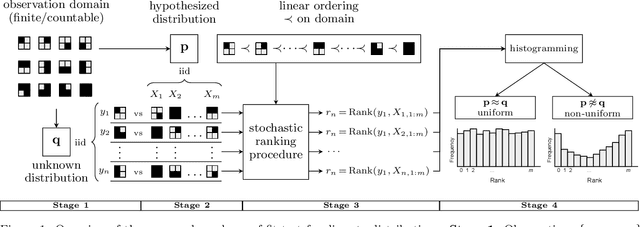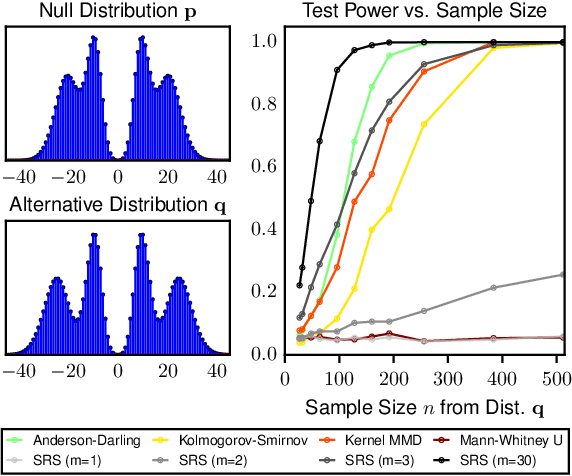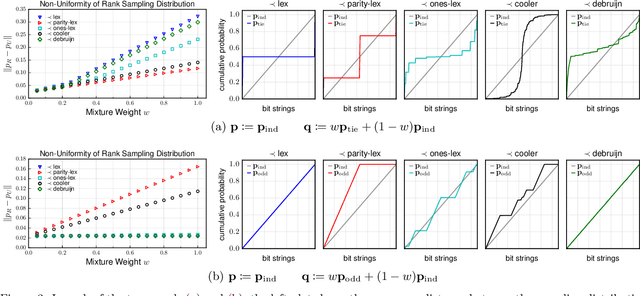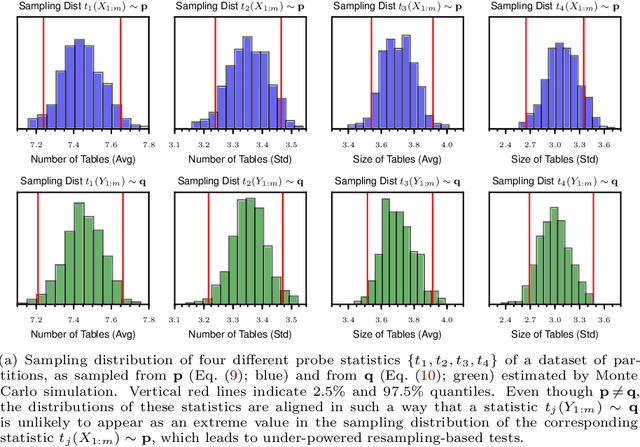Cameron E. Freer
A Family of Exact Goodness-of-Fit Tests for High-Dimensional Discrete Distributions
Feb 26, 2019



Abstract:The objective of goodness-of-fit testing is to assess whether a dataset of observations is likely to have been drawn from a candidate probability distribution. This paper presents a rank-based family of goodness-of-fit tests that is specialized to discrete distributions on high-dimensional domains. The test is readily implemented using a simulation-based, linear-time procedure. The testing procedure can be customized by the practitioner using knowledge of the underlying data domain. Unlike most existing test statistics, the proposed test statistic is distribution-free and its exact (non-asymptotic) sampling distribution is known in closed form. We establish consistency of the test against all alternatives by showing that the test statistic is distributed as a discrete uniform if and only if the samples were drawn from the candidate distribution. We illustrate its efficacy for assessing the sample quality of approximate sampling algorithms over combinatorially large spaces with intractable probabilities, including random partitions in Dirichlet process mixture models and random lattices in Ising models.
* 20 pages, 6 figures. Appearing in AISTATS 2019
Towards common-sense reasoning via conditional simulation: legacies of Turing in Artificial Intelligence
Oct 09, 2013



Abstract:The problem of replicating the flexibility of human common-sense reasoning has captured the imagination of computer scientists since the early days of Alan Turing's foundational work on computation and the philosophy of artificial intelligence. In the intervening years, the idea of cognition as computation has emerged as a fundamental tenet of Artificial Intelligence (AI) and cognitive science. But what kind of computation is cognition? We describe a computational formalism centered around a probabilistic Turing machine called QUERY, which captures the operation of probabilistic conditioning via conditional simulation. Through several examples and analyses, we demonstrate how the QUERY abstraction can be used to cast common-sense reasoning as probabilistic inference in a statistical model of our observations and the uncertain structure of the world that generated that experience. This formulation is a recent synthesis of several research programs in AI and cognitive science, but it also represents a surprising convergence of several of Turing's pioneering insights in AI, the foundations of computation, and statistics.
* 51 pages, 6 figures, 1 table. Slight typographical fixes
Computable de Finetti measures
Dec 19, 2011Abstract:We prove a computable version of de Finetti's theorem on exchangeable sequences of real random variables. As a consequence, exchangeable stochastic processes expressed in probabilistic functional programming languages can be automatically rewritten as procedures that do not modify non-local state. Along the way, we prove that a distribution on the unit interval is computable if and only if its moments are uniformly computable.
* 32 pages. Final journal version; expanded somewhat, with minor corrections. To appear in Annals of Pure and Applied Logic. Extended abstract appeared in Proceedings of CiE '09, LNCS 5635, pp. 218-231
On the computability of conditional probability
Dec 17, 2011
Abstract:As inductive inference and machine learning methods in computer science see continued success, researchers are aiming to describe even more complex probabilistic models and inference algorithms. What are the limits of mechanizing probabilistic inference? We investigate the computability of conditional probability, a fundamental notion in probability theory and a cornerstone of Bayesian statistics, and show that there are computable joint distributions with noncomputable conditional distributions, ruling out the prospect of general inference algorithms, even inefficient ones. Specifically, we construct a pair of computable random variables in the unit interval such that the conditional distribution of the first variable given the second encodes the halting problem. Nevertheless, probabilistic inference is possible in many common modeling settings, and we prove several results giving broadly applicable conditions under which conditional distributions are computable. In particular, conditional distributions become computable when measurements are corrupted by independent computable noise with a sufficiently smooth density.
 Add to Chrome
Add to Chrome Add to Firefox
Add to Firefox Add to Edge
Add to Edge